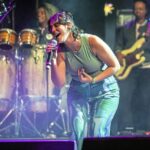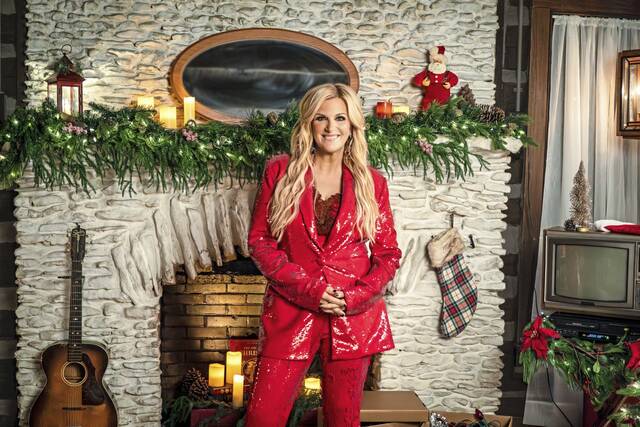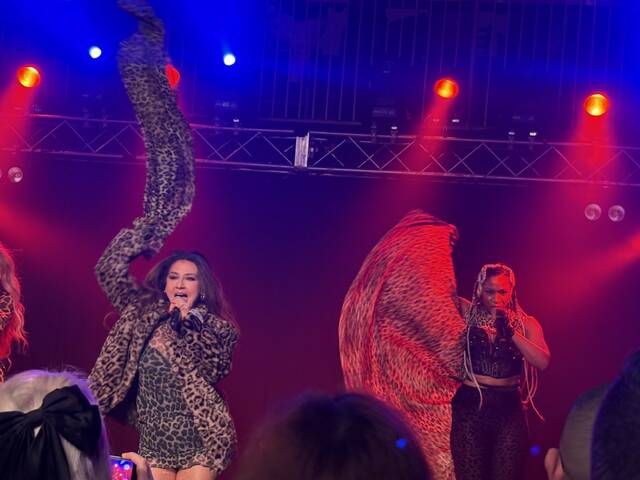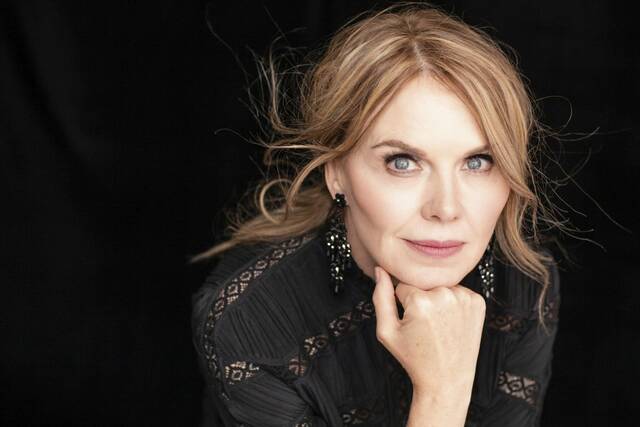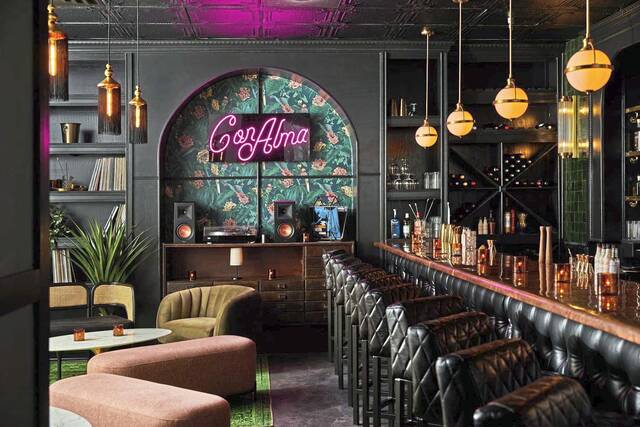The goal of a Sammy Rae & the Friends show is to be more than a concert — it should be an experience.
“That’s the idea, right? If people are going to trust us with their night and come on out and spend time with us, I think it’s important that we give them a great experience where they feel really welcomed and they can feel our gratitude that they showed up,” the 29-year-old Rae said. “The only reason we get to do the thing we love so much for a living is because they showed up, so we try to find as many different ways as we can to say thank you every night and kind of always make sure they can feel that gratitude.
“I think part of that is creating that very celebratory space. It’s hard to say thank you very loudly if the concert was just me crying into the microphone or something.”
The seven-piece ensemble — with Rae singing, C-Bass Chiriboga on drums, Will Leet on guitar, James Quinlan on bass, Kellon Reese on alto saxophone, Debbie Tjong on keyboards and Max Zooi on tenor saxophone — will bring that celebration to the Pittsburgh area on Sunday for a sold-out show at Mr. Smalls Theatre in Millvale.
The Friends have released two EPs — “The Good Life” in 2018 and “Let’s Throw A Party” in 2021 — as well as a live album, “The If It All Goes South Tour (Live),” earlier this year.
In an interview Tuesday from Cleveland, Rae discussed the importance of authenticity, being a representative for the queer community and an early influence from Bruce Springsteen and the E Street Band.
On developing the band’s “theatrics” and performance style:
I think being the frontperson of a band and being a highly expressive band like ours is a learned skill that takes time, and it’s kind of difficult to be, you never really know what’s going to work in front of the audience and what’s not. But, no, it didn’t take a long time in that we all come from theater, we’re all sort of theater kids, most of us, I can say, so it was easy for us to feel comfortable in front of an audience, being so expressive ….
But there was a little learning curve because we had to get to know our audience and what they like, what they don’t, what we can trust them with, what they trust us with. You know, we could’ve ended up with an audience that would rather just listen to the singer/songwriter moments and that would’ve adjusted the show. But we got to know them over the first couple years, and that’s where we put on the show that they seem to all love and we love putting on.
On her highly expressive stage presence:
It’s kind of hard to believe when I tell some people this, but that’s just who I am. We made this decision very early on in the history of this project that we were going to be as wholly and authentically ourselves, as genuinely ourselves, as humanly possible. And if not, then we’re not going to bother. Because if you’re not being really fully authentically yourself, the audience can smell it first of all, so they’re not going to buy it after a while. Second of all, you’re going to get exhausted of pretending to be something that you’re not every night.
Now there has to be some sort of (boundaries) on stage in order to keep yourself safe. I’m not up there like singing about how much I love my partner and my family issues or whatever. You gotta do some keeping yourself safe and stepping into something else when you get on stage. But in terms of that personality, I mean that’s all of our personalities on stage and off. We’re loud people. We care very much about each other, we love each other dearly and we express that on stage and off stage. We’re all high-energy individuals.
On the song that sums up the band the best:
I would probably recommend ‘Jackie Onassis.’ It’s a high-energy song, it’s got two saxophones ripping their faces off and playing hard. It’s got heart-felt lyrics; it’s got a queer undertone. It’s very celebratory, it’s very upbeat. It sounds like a party and it rocks kind of hard in the middle there. Yeah, I think that’s kind of the quintessential Friends song.
It’s tough because every Friends song kind of differs from one song to the next; it’s kind of a something for everybody sort of sound. There’s a lot of range in our library, but ‘Jackie O’ is probably the quintessential Friends song in that it’s got a little bit of everything that you usually find on a Friends song.
On the possibility of the band’s musical growth:
There’s constantly potential for evolution. At the very beginning, so much of the, we call ourselves the Friends, and so much of the mission statement of this project is that we are a family, through and through. And we made these decisions of what we wanted to be and how far we wanted to go, what we wanted to transform this thing into, very early on, but a big part of that generating a project which is sustainable and has longevity, a big part of that was, we gotta take care of each other then. Because if we can, if we already love each other as old people, we want to do this forever and we want to get old in front of an audience and be legendary, you know, like Fleetwood Mac or the Rolling Stones or the E Street Band or that sort of thing, if we want to do this forever, oh yeah, we have to take care of each other.
So from the very beginning, it’s been a lot about effective communication and family dynamics. We just have to treat each other as family, and that’s going to create this real bedrock of trust and something that can survive the test of time and different evolutions. There’s always room to evolve, and we’ve been this core group of individuals for several years now. We just actually recorded our first full-length album, and we’re making strides to incorporate more of who we are now.
When we made our first EP, we were all in our early 20s or late teens even. Now it’s been seven years of being on the road and shows and being in the studio, so the album we’ve made we think is a very accurate picture of where we are now and where we’d like to go. And we think our audience is ready for it, and we’re certainly ready for it. But there’s always room to grow and try new things. We’ll try new things with every release, and sometimes they stick and sometimes they don’t, but again, it’s that overarching theme of not limiting yourself and being authentic and therefore you do whatever you want. If it doesn’t work, it doesn’t work, but you tried!
On being true to herself and whether she feels like she needs to be a representative for the queer community:
Yes, in that I think we need to have more visibility for queer artists existing in predominantly non-queer spaces. That’s a win for the queer community just to have more queer artists out there telling their stories. I feel like I am, I’m an openly queer artist, and I think there are a lot of artists that are queer and not open about that, so I do kind of consider myself a representative for that community. A lot of the fan base that we attract is young and queer and trying to navigate and figure out who they are and what they want out of life, so therefore I consider myself an example to them, I would hope.
But no, in that, the way that I want to be an example is by simply existing in these predominantly non-queer spaces as a queer woman. I think that the biggest strides for the LGBTQ community, or really any marginalized community, is when members of that community are just existing, like in space, taking up space, and being great. I think it’s more of a win for the community if I walk into a new venue and I shake the stage manager’s hand and just say, ‘Hi, I’m Sam. Good to meet you, thanks for having us.’ And then I run the show without a big song and dance, or they walk away from that experience with ‘Oh, there’s that woman who was in charge, and maybe she’s a queer, but I don’t know.’ I think that’s a bigger statement than me running around left and right, ‘I’m a queer woman, and I’m going to be in charge. And you’re going to like it.’ I can just again be an example by living my truth and being who I am and existing in those spaces.
Related
• Ratboys singer Julia Steiner on ‘The Window,’ processing loss and her Steelers fandom
• Review: Peter Gabriel serves up show for 21st century at PPG Paints Arena
• Pittsburgh area concert calendar
On the band’s career trajectory, which didn’t follow a normal path:
I will say it’s created an interesting timeline for our project versus projects that might be a little smaller because we didn’t get to tour right away in somebody’s Camry like a solo artist or a duo or a quartet might. You know, we’re from Brooklyn. ‘Let’s leave Brooklyn and go play Boston and Philly and D.C. for a weekend and let’s take the Corolla or whatever.’ We’re seven people — for a while we were eight people — plus gear. I never wanted to make the sacrifice of paring the size of the project down; I never wanted to do that, and how could I? Everybody in my band is so important to me, and everybody plays an important role so how could I say, ‘I’m only taking a quartet for this show.’ So we had to wait a little bit until we could afford a Sprinter (van) instead of somebody’s Corolla to get us on the road.
We had to wait a little bit until we could afford two or three hotel rooms. We made it happen, it was crappy in the beginning, but I think it took a little while for us to get mobile and start touring and start making some real money with this. It’s just more time than it would for the average band which is smaller. So it’s created an interesting timeline for us, but it’s all the more rewarding.
On the influence of Bruce Springsteen and the E Street Band:
For one, Bruce Springsteen and the E Street Band introduced me to a rock and roll saxophone, and I liked it so much I have two of those in my band. Something I loved about that band from the very beginning, first of all, I thought that Bruce was a brilliant songwriter. He was one of the first songwriters I was exposed to, but he was also the first rock star I was exposed to. I thought that band was so cool because in every picture and every video you see, they’re just like showing each other so much love, they have that family dynamic and everybody is as talented as the person next to them. It’s not just about Bruce, it’s about everybody.
And that is exactly what I wanted to do from the very beginning. I didn’t just want to be the only person anybody paid attention to, I wanted to be a part. I wanted to be in front of, but not greater than, a very talented, very large band. And when you’re little, you see a band like that, you don’t fully understand what it takes to be a touring musician — how could you? — but you see a band that digs each other that much, that seems to be having that much fun on stage and is that large and making such a big sound, it’s almost a mess of a big sound, and as I kid, I was just like, ‘Wow. These guys get to travel around the world with their friends and make music and play.’
They just gave me this energy of, like, perpetual child. Rock stars are perpetual child, and that could be to their benefit or their dismay. I think to their dismay is when, you know the road’s a hard life and you turn to substances or unhealthy behavior to try to keep you on the road, but to your benefit, to be in perpetual child mode that you get to just play in front of audiences every night in so many different senses of the word, fall on the floor, sweat and be messy, roll around and hug your friends and people just love it. They just go for it. And that perpetual child, that adult play, that self-expression, that sense of community, it’s also a very diverse group when you look at Bruce Springsteen and the E Street Band.
I wanted to exemplify that in my project as well. I wanted people from all sorts of different walks of life, and over the course of the years, that’s what we found, that’s the Friends.




